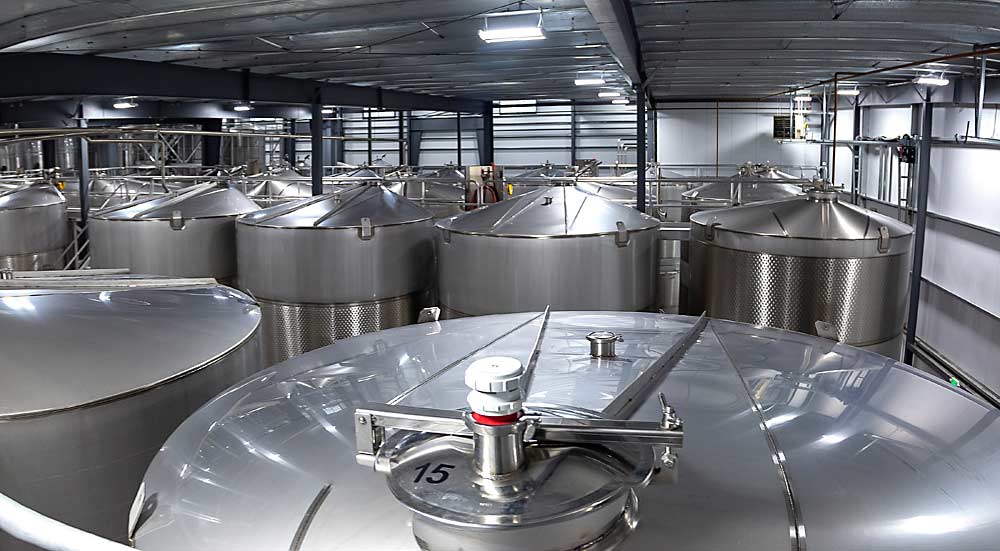—story by Kate Prengaman
—photo by Ross Courtney

It was a tale of two wine regions: one without any grapes after a devastating freeze and another with a surplus and a strong crop.
“It’s the perfect marriage, because (Washington) has too many grapes and we don’t have any,” said Ron Kubek, owner of Lightning Rock Winery in Summerland, British Columbia. He made several trips south to Washington this summer to source grapes after he lost the entire crop on his 23-acre vineyard during a January deep freeze that took out almost every grape bud in the province.
In late July, the provincial government announced that, for the 2024 vintage, it would temporarily allow British Columbia wines to be made with grapes and juice grown outside the province.
“This provision allows us to stay in business,” while vineyards recover or are replanted, said Miles Prodan, CEO of Wine Growers British Columbia.
Most of the region’s 350 or so wineries are small, “land-based” wineries that are required by their sales agreements with the BC Liquor Distribution Branch to source 100 percent of their grapes from British Columbia and a portion from their own lands, he said. Commercial wineries that can and do import grapes face 89 percent markups. The land-based requirement is being waived for 2024, so those wineries can produce a “replacement vintage.”
“It might be grapes from Washington or must from Oregon or unfinished wine from Ontario — it’s making sure it’s going to make a good, quality product consumers will be interested in,” Prodan said.
Other relief measures include waiving the minimum production requirement for wineries to renew their licenses and allow the land-based wineries to revert back to that status next year.
“Everybody wants this to be temporary; everyone wants to get back to 100 percent B.C. wines,” said Prodan, whose organization does the marketing and advocacy for the wineries making 100 percent British Columbia wines.
The challenge, according to Kubek: The time frame on marketing that replacement vintage, from April 2025 to March 2026, doesn’t allow for red wine production or his specialty, traditional sparkling production.
“B.C. is going to be flooded with aromatic whites,” he said, unless the exemption is extended.
Moreover, many of the region’s vineyards need to be replanted, meaning it will take several years to recover.
For Washington growers, the ability to help supply British Columbia wineries this year and perhaps beyond is “good news when there is none,” said John Derrick, vice president of vineyard operations at Mercer Ranches and a board member for the Washington Winegrowers Association.
“This is a real positive, and there will be relationships made,” he said. “I envision B.C. producers using Washington products for years to come, but what those volumes end up being, it’s hard to say.”
Washington Winegrowers spent months coordinating an effort to understand the process and paperwork needed to export to British Columbia, and the association developed fact sheets for the industry, Executive Director Colleen Frei said.
“It’s definitely an unfortunate situation, but for Washington to be able to help and support is really fantastic,” she said. “It helps us place a lot of our supply as well, as we had a great harvest last year and we’re looking at another large crop this year.”
She thanked the Washington State Department of Agriculture for its help navigating the situation.
Kubek said the good news is that he’s finding high-quality fruit from Washington that can be delivered to his winery in Summerland for far less than he’d pay locally, given the high input costs, high land values and nonexistent economies of scale in British Columbia.
“Last year we paid $4,400 for a ton of Cab Franc. This year I am picking it up delivered for $2,200,” he said.
That has him thinking about opportunity beyond this vintage, envisioning his winery making long-term partnerships with Washington growers to supply a line of wines Kubek sells in other Canadian markets, even as his own vineyard recovers.
“In Canada, there is no free trade among provinces,” Kubek said, so he faces steep markups in other provinces, the same as European imports do. “With the quality of the Washington fruit at a much more reasonable price, we can then ship to the rest of Canada while we keep our fruit for B.C. wines.” •






Leave A Comment